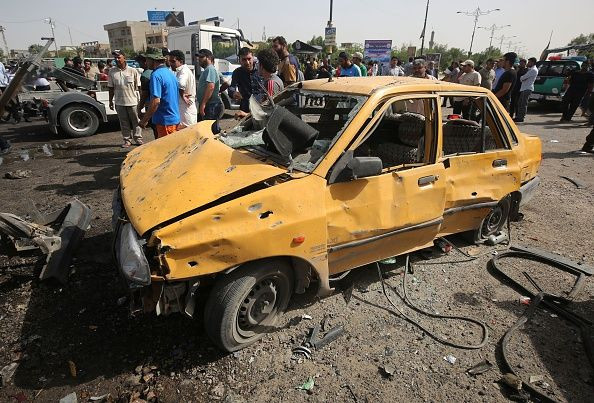ISIS Car Bomb Attacks Return With Vengeance In Baghdad, Killing Hundreds

Hundreds of people have been killed and wounded in Baghdad over the last week as a result of car bombings staged and detonated by the Islamic State group. The attacks come as the Parliament argues over who to appoint to Prime Minister Haider al-Abadi’s cabinet and as security forces battle the militant group in Iraq’s western Anbar province.
On Tuesday, the militant group, also known as ISIS, claimed responsibility for at least one of the suicide bombs in the city. One detonated in a marketplace in the northern district of al-Shaab and killed 38 people and wounded over 70 others. Another car bomb in nearby Sadr City left at least 19 more dead and 17 wounded. Last week, a series of three bombs killed 100 people in neighborhoods throughout the capital. The attacks mark the deadliest period in the city since the beginning of the year.
In light of the attacks, Abadi announced that he plans to arrest the head of security in al-Shaab.
أمر رئيس مجلس الوزراء بتوقيف المسؤول الامني المباشر عن منطقة التفجير الارهابي الذي وقع اليوم في مدينة الشعب بالعاصمة بغداد
— Haider Al-Abadi (@HaiderAlAbadi) May 17, 2016
But Abadi’s power in the central government is waning. For weeks, he has attempted to reshuffle his cabinet to rid the government of corruption by appointing technocrats. However, the cabinet is still not approved. Muqtada al-Sadr, a powerful Iraqi Shiite cleric who used to support Abadi, has led protests in the Green Zone, calling on the government to form a new cabinet.
Following the fall of Mosul to the Islamic State group in June 2014, the terrorist group attacked the city with car and suicide bombings. More than 500 people were killed in Iraq in such bombings in the month of October 2014 alone, according to Iraq Body Count, a monitoring group tracking civilian deaths. (A report by the Soufan Group, a private intelligence provider, found that 80 percent of the suicide attacks in Iraq between September and mid-October in 2014 were committed by foreign fighters.) Since then, though, the violence had simmered until the attacks last week.
In 2013, there were more than 250 fixed checkpoints in Baghdad and hundreds of other smaller, mobile ones. They were established to curb car bombings. The mobile checkpoints, which each consist of a few dozen armed men, have been set up in neighborhoods across Baghdad, even in those that have not suffered attacks. The increased presence on the streets is an attempt by the Iraqi security forces to detect cars packed with bombs.
But the increased checkpoints in Baghdad might not be enough to deter attackers. The checkpoints themselves are often targets of car bombs. With more and more checkpoints forming across the city, security forces are now at greater risk of being targeted. A 2010 Al Jazeera report found that more than 700 people, including women and children, were killed in Iraq for coming too close to checkpoints.
The landscape in Baghdad and throughout the country, though, has changed significantly since then.
The bombings in Baghdad come as the Iraqi forces and U.S. advisers work to defeat ISIS in Fallujah, a city west of Baghdad in Anbar province. That battle has stalled for several months as Iraqi security forces have tried to avoid killing civilians. The government forces have also focused their efforts on crushing ISIS in Makhmur, a town just south of Mosul that connects to some of the group’s last oil fields in Al-Qayyarah. Iraqi forces took control of Makhmur last week, though some militants remain inside the city.
© Copyright IBTimes 2024. All rights reserved.





















